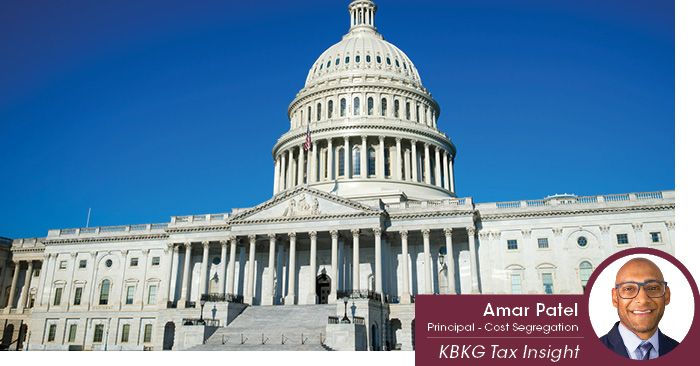
What is Cost Segregation?
Cost Segregation is a commonly used strategic tax planning tool that allows companies and individuals who have constructed, purchased, expanded or remodeled any kind of real estate to increase cash flow by accelerating depreciation deductions and deferring federal and state income taxes.
How Does a Cost Segregation Study Work?
When a property is purchased, not only does it include a building structure, but it also includes all of its interior and exterior components. On average, 20% to 40% of those components fall into tax categories that can be written off much quicker than the building structure. A Cost Segregation study dissects the construction cost or purchase price of the property that would otherwise be depreciated over 27 ½ or 39 years. The primary goal of a Cost Segregation study is to identify all property-related costs that can be depreciated over 5, 7 and 15 years. For example, certain electrical outlets that are dedicated to equipment such as appliances or computers should be depreciated over 5 years.
KBKG goes beyond a traditional Cost Segregation study and will also separate all of the different building structural components (such as the roof, windows or HVAC units) so when they are replaced, a loss deduction can be claimed on them. For leased property, we also separate tenant leasehold improvements.
Case Studies by Building Type
Estimate Your Cost Segregation Savings Instantly
The Cost Segregation Savings Calculator estimates your federal income tax savings and provides:
- Estimated allocation to 5, 7, 15, and real property
- Tax deductions and additional cash flow by year
- Net present value over 10 years and over the life of the property
Try it for free. Enter basic building info and instantly receive the estimated tax savings.
What is Involved in a Cost Segregation Study?
A quality Cost Segregation study evaluates all information, including available records, inspections, and interviews, and presents the findings in a clear, well-documented format. Our process for conducting a detailed Cost Segregation includes a review of any available cost detail for the property, a review of any available blue prints and a physical inspection of the property. If none of this information is available, a Cost Segregation study can still be performed by estimating component values on site.
When should a Cost Segregation study be conducted?
A Cost Segregation study can be completed any time after the purchase, remodel or construction of a property. However, the optimum time for a study for new owners is during the year a building is constructed, purchased or remodeled. For investors who are in the planning phases of construction or remodeling, the best time to consider a Cost Segregation study is before the infrastructure of the building is set. KBKG offers a free preliminary analysis that can help determine the right timing and strategy for any investor.
What should I consider when selecting a Cost Segregation provider?
You should always read the bio and resume of the persons signing your Cost Segregation study. Make sure they are certified with...READ MORE »
Will the company be available if I get audited by the IRS?
Any company can give you a Cost Segregation report with results that save you a lot of money; the real question is whether it will stand up to IRS scrutiny. The true value of the fee you pay is how easy (or painful) the audit process goes. Every Cost Segregation company will say...READ MORE »
Does the company have tax experts that can help if my CPA has questions?
There are so many unique fact patterns and situations that can have a tax impact on how the Cost Segregation deductions will flow through on your tax return. A Cost Segregation engineer does not know enough about tax to truly understand how the Cost Segregation deductions will specifically impact you. Using a firm with tax experts on staff will...READ MORE »
What are the Benefits of Cost Segregation?
Many business owners are surprised to learn of the compelling tax savings a cost segregation study offers. Below is a list of three of the most prominent benefits.
Cash Flow
Generates immediate increase in cash flow through accelerated depreciation tax deductions
Write Off
Quantifies property’s major components and leasehold improvements so they can be written off when replaced or renovated
Review
Provides an independent third-party analysis that will withstand IRS review.
Cost Segregation Tax Insights

Cost Segregation and Opportunity Zones: What Works and What Doesn’t Under the Latest Tax Law
08/06/2025Follow KBKG on Social Media Linkedin Facebook X-twitter Youtube By Eddie Price| Principal, Cost Segregation With the passage of the One Big Beautiful Bill Act (OBBBA), Opportunity Zones (OZ) have shifted from a temporary incentive to a permanent fixture, fundamentally altering how real estate investors should approach tax strategy. The bill creates new benefits specific … Read More

How Manufacturers Can Now Fully Expense Their Facilities and Real Property
07/23/2025Follow KBKG on Social Media Linkedin Facebook X-twitter Youtube By Lester Cook | Principal, Cost Segregation The 2025 One Big Beautiful Bill Act (OBBBA) introduced a significant opportunity for domestic manufacturers with the creation of Qualified Production Property (QPP) under new IRC §168(n). This new category allows eligible taxpayers to fully expense certain real estate … Read More

Real Estate Incentives Revitalized: What the OBBBA Means for Developers, Investors, and Owners
07/17/2025Follow KBKG on Social Media Linkedin Facebook X-twitter Youtube By Lester Cook | Principal, Cost Segregation The One Big Beautiful Bill Act (OBBBA), signed into law on July 4, 2025, permanently restores and enhances key provisions of the Tax Cuts and Jobs Act of 2017. From 100% bonus depreciation and qualified production property expensing to Opportunity … Read More

OBBB Tax Bill Makes 100% Bonus Depreciation Permanent – What You Need to Know
07/09/2025Follow KBKG on Social Media Linkedin Facebook X-twitter Youtube By Amar Patel | Principal, Cost Segregation Real estate investors know that tax strategies can make all the difference in maximizing profits. One of the most powerful, yet underutilized, tools available is the short-term rental (STR) loophole. This allows real estate investors to utilize property-related rental losses … Read More

Why You Should Only Use a Certified Cost Segregation Professional
06/09/2025Follow KBKG on Social Media Linkedin Facebook X-twitter Youtube When Cost Segregation studies are conducted, professional standards and technical accuracy are critically important, especially as studies are subject to IRS scrutiny. The best way to assess a provider’s qualifications is to confirm whether the person conducting your study is a Certified Cost Segregation Professional (CCSP) … Read More

Form 3115 for CPA’s: Unlocking Missed Tax Deductions Without Amending Returns
06/04/2025Follow KBKG on Social Media Linkedin Facebook X-twitter Youtube Many CPAs likely come across clients who have historically mis- or over-capitalized expenditures, particularly in real estate, retail or manufacturing. Fortunately, tax preparers don’t need to amend years of returns to correct these issues. The IRS offers a fix for this with Form 3115 (Application for … Read More

Navigating the Updated IRS Cost Segregation Audit Techniques Guide: What’s New?
05/30/2025Follow KBKG on Social Media Linkedin Facebook X-twitter Youtube By Amar Patel | Principal, Cost Segregation Cost Segregation remains one of the most powerful tax strategies for real estate investors, allowing them to accelerate depreciation and maximize deductions. On February 6, 2025, the IRS published the latest edition of the Cost Segregation Audit Techniques Guide (ATG), … Read More

How The Short-Term Rental Loophole & Cost Segregation Can Benefit Passive Investors
05/21/2025Follow KBKG on Social Media Linkedin Facebook X-twitter Youtube By Amar Patel | Principal, Cost Segregation Real estate investors know that tax strategies can make all the difference in maximizing profits. One of the most powerful, yet underutilized, tools available is the short-term rental (STR) loophole. This allows real estate investors to utilize property-related rental losses … Read More

The Interplay Between Cost Segregation and a 1031 Exchange
04/22/2025When a property is acquired in a Section 1031 like-kind exchange, tax preparers should consider several facts before deciding how to best depreciate the carryover basis from a relinquished property. When a cost segregation study is also considered on the newly acquired property, additional analysis is recommended before finalizing the 1031 tax basis calculations. To … Read More

100% Bonus Depreciation Making a Comeback?
03/17/2025By Amar Patel | Principal, Cost Segregation In a speech to a joint session of Congress, President Trump outlined priority tax legislation expected later this year to restore provisions of the Tax Cuts and Jobs Act (“TCJA”), which includes “providing 100% expensing, retroactive to January 20, 2025”. This leads many to believe that 100% Bonus Depreciation … Read More


